#busy work life + busy Tumblr life = executive functioning nightmare
Note
Hey, it’s me again.. I took a little time off to elaborate all of this, I went through various stages of disappointment, sadness and anger, but now I’m feeling better (even though it left a bitter taste in my mouth).
I did read all of the comments and reblogs to your posts, they made me cry (in a good way!) and I started to feel less alone indeed, a heartfelt thanks goes to them, definitely ❤️ this is what a fandom should be, whether it is Good Omens’ fandom or Neil Gaiman’s fandom (well I hardly see myself becoming part of his fandom now, even though I like some of his works, i.e. The Sandman).
The fact that he’s a writer is the reason why I weighed his words so much, otherwise I would have thought “okay maybe it was a poor choice of words and didn’t mean that”.. He knows exactly what he did instead, he used his skill with words against someone who barely speaks his language. This was unfair and unnecessary on so many levels imo.
About my ask, in my mind this was a point of view that maybe could’ve been useful for him to consider. I asked that in his interest, I mean, at the end of the day it’s his series, not mine. He didn’t even try to understand, instead. The point he’s missing with Staged is that Staged is not any series, it’s a series where the main characters (the two couples, but there’s also Ty in the third season) are supposed to be the actors’ real personalities and relationships (“supposed to”: I know they’re still fictional), so seeing all of them together in a scene of any series (not only Good Omens) would feel like breaking the fourth wall to me. I know it’s not something that everybody would experience, but definitely some people would. The nepotism thing is kind of connected to this, but mostly I’m really concerned about David Tennant being accused of that (the first “joke” was already there at Basingstoke). I mean, if Georgia had accepted the role and Olive had passed the audition, there would have been four members of his family involved (I know Peter Davison is an accomplished actor, but he’s also part of the Tennants family portrait, especially talking about Doctor Who), they’re just two for now, but the fact that Neil said that in a hypothetical season three, he would like to offer Georgia and Anna a part… The risk was there again. Maybe he thought that it would please the fans who always idolise them no matter what; this part of fans is really loud, but that doesn’t mean that they’re the actual majority. Also, this doesn’t mean that I hate them either, I would never do something like this out of hate, I’m not so miserable.
In summary, I just wanted him to read and consider that, I wasn’t really interested in an answer, tbh. It’s not like I was expecting something like “yeah, this is nepotism on my part! Thanks for asking xx” (though… That would’ve been a funnier response). As I said previously, this might have been an impulsive decision, and even a naïve one.
(1/2)

Hello, Anon. I'm back from my work trip and finally not entirely exhausted, so now I can answer your Ask and all of the other Anons still waiting in my inbox.
I'm glad to hear from you again, and that you are feeling better. I very much relate to what you said about having a tendency to blame yourself for everything, because I do the exact same thing. But there is a difference between blame and responsibility, and while you are responsible for choosing to ask Neil that question, you are not to blame for how he chose to respond to it.
You mentioned not being sure what to do now, and thinking about sending him Crowley's line about asking questions (which is also something that I thought of when this whole thing happened). My personal suggestion would be not to message him at all, as there really isn't anything else that can be said and I think it would probably just give you more anxiety worrying about if/how he'd respond again.
The thing to keep in mind is that Neil is who he is. Being a writer does not automatically make someone better or smarter than anyone else--Ernest Hemingway was an abuser and a drunk; Hunter S. Thompson was, well..."LSD-soaked madman" is putting it generously; F. Scott Fitzgerald's relationship with Zelda made Kanye and Kim K. look Amish, and the list goes on--but what I think has happened with Neil is that there is such a hype around who fans perceive him to be...the "image" of Neil Gaiman as opposed to the actual human Neil Gaiman. What we have now had a glimpse of is the actual human, and that for as calm and cool as Neil always seems to come across, there are clearly things that can still ruffle his metaphorical feathers.
I don't know if you've visited Neil's blog again, by the way, but just a few days ago, he responded to this Ask which I and everyone else who read it would most definitely categorize as "creepy"...and yet he answered it and did not call that person out the way he did with you. What that tells me is that what happened with you was not because of anything you did, but because Neil read it the way he did. And there could be so many other factors at play as well--the fact that he is in the middle of a divorce, the effects of the Writers' Strike and what that will potentially mean for GO 2--that ultimately contributed to his mindset while answering.
The other thing I will say is that I've already seen part of your concerns come to life, as following the release of the GO 2 opening credits, some fans were insisting that the order of David and Michael's names in the sequence and David's name supposedly appearing first (as opposed to Michael's in the S1 credits) was a reference to Staged:
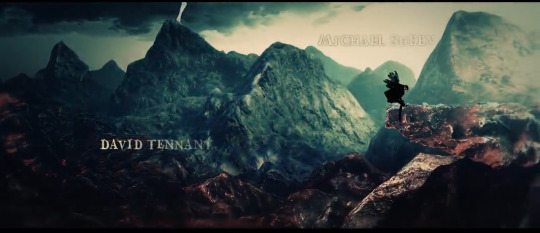
In actuality, both David and Michael's names appear at the same time (but Michael's is less visible due to being in the sky). Neil even seemed to confirm this when someone recently asked about it. Not only that, he did not mention anything about Staged at all, which in all likelihood means it was probably not a specific reference. But seeing fans rush to this conclusion seemingly validates what we've been saying all along, and when I saw it, I immediately felt annoyed. For me, Good Omens and Staged are two very different things, as well as entirely separate things, and I categorically do not like the feeling of looking at anything related to GO and thinking of Staged. Only my opinion, of course, but there it is.
Finally, regarding the nepotism situation, one thing I've also noticed is people saying that this is somehow brand new, or that no one cared before GO 2. As I've mentioned previously, I became a fan of Michael's and "got into" him before I did David, so I will fully admit to being less knowledgeable around the nepotism issues there (Ty in ATWI80D, Georgia getting a part in DW because of Peter, then producing YM&H). But I can say with absolute certainty that concerns of nepotism with Anna were being voiced years ago, as far back as the first season of Staged and then right through to her being in Last Train to Christmas in 2021. So this is not remotely anything new, nor related only to GO, but to every role AL has had (Staged, LTTC, and Sandman), all of which she has gotten because of Michael.
I would also encourage people to read this post from last year on @invisibleicewands' blog for some very insightful tea about nepotism. One commenter is a former actor and shared some extremely interesting information in the notes in particular, of which I'd like to share a few:
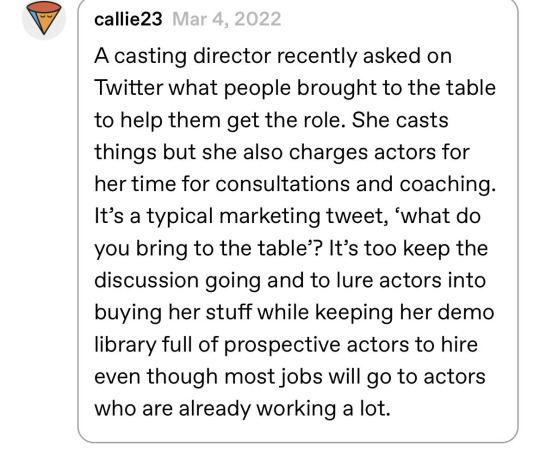
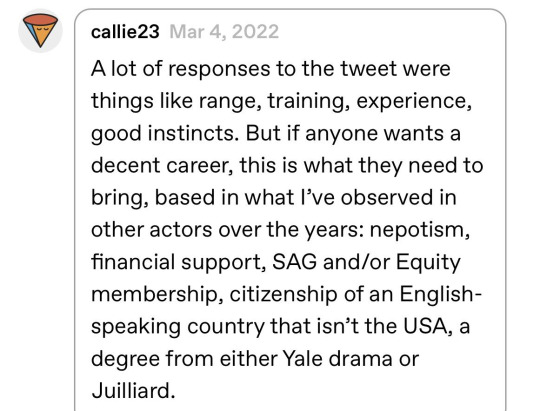
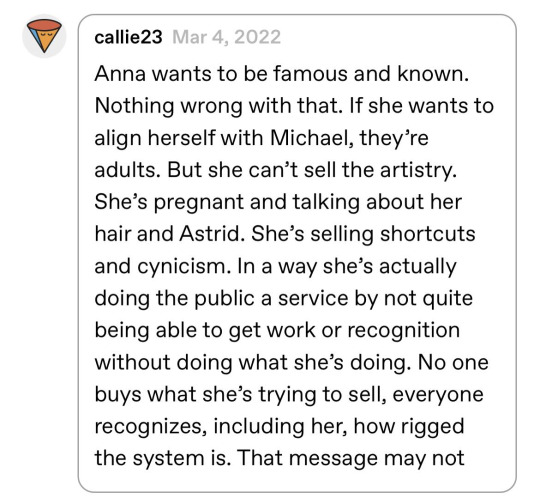
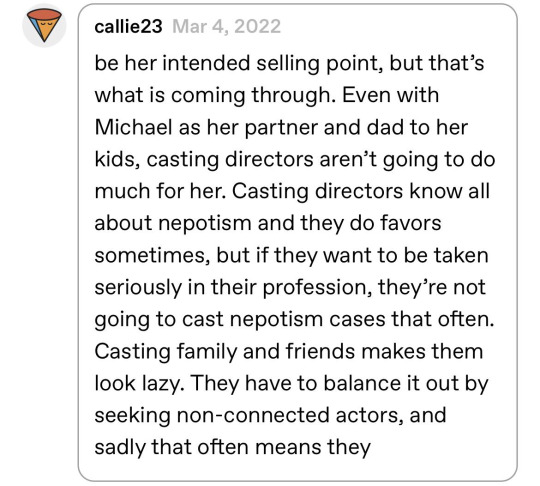

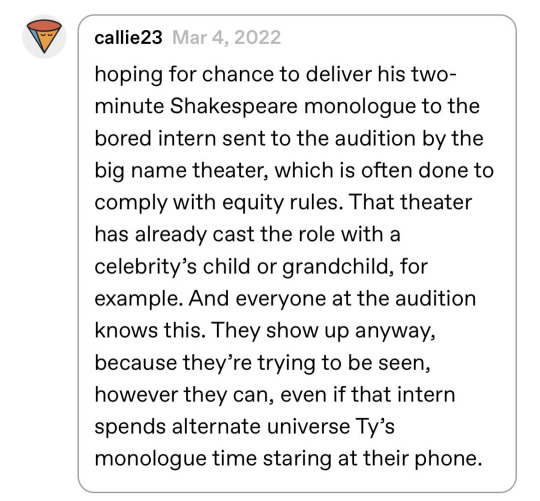

I'm very willing to bet that all of the above--especially the part about casting directors and casting practices--are things Neil already knows, and are at least part of what caused his disproportionate response to your question. Because if this is something well-known and common to the industry, you are very likely not at all the first person who has brought this up to him, as well as the fact that four members of the same family (David, Ty, Peter, Georgia) nearly ended up in the same season of one show (GO season 2).
Could Neil have had enough and just snapped? Sure. We all have our limits, our quota of what we can handle at any given time, in any given day. And he would have absolutely been well within his rights to ignore your question entirely. That he read it as being "not in good faith" tells me this is a subject that's come up before, and has led to him being on the defensive. Which, again...also understandable. But the fact that Neil--who is a writer, who has spent an untold amount of his life writing about all sorts of things in painstakingly detail-- couldn't parse a fan asking a genuine question or distinguish it from an attack is not okay, and neither was his choice to respond so condescendingly and set you up as a target for the larger fandom.
But you already know all this, Anon, so let me stop before I repeat myself too much. I am just glad that you decided to write to me again, and that you took such comfort from both my words and the folks who commented on my post. I am sorry that the whole thing has left such a bitter taste in your mouth (though understandably so), but with all the wonderful new things we've gotten in the last few days (opening credits, the new poster), that thankfully gives us happy things to focus on instead.
Sending you lots of love again and the hope that you will continue to feel better and not let this take away your excitement for GO 2 entirely. Thanks for writing in! x
#anonymous#reply post#neil gaiman#david tennant#soft scottish hipster gigolo#ty tennant#georgia tennant#good omens#apologies for this taking so long but i've been nonstop busy for four days#last weekend was exhausting as well#busy work life + busy tumblr life = executive functioning nightmare#glad i got to answer this though#fandom woes#discourse
17 notes
·
View notes
Text
Yolanda, Camp Sensibility and the "Oscar Wilde Of The Camera"
Okay, so I was minding my business reading stuff for my work on dream narratives in popular culture and suddenly I was attacked at the footnotes section of one of the academic papers (which happens all the time tbh). The author mentioned in passing that, well, there is a musical called YOLANDA AND THE THIEF (1945) which just happens to be one of three Vincente Minnelli musicals that have been characterized as a self-conscious camp style of visual excess. The author argued that the camp style in musicals, especially those made by the Arthur Freed unit at MGM, was particularly appropriate to the even greater visual excess of the dream sequences.
So yeah, of course I did a double-take and immediately thought of Donde estás Yolanda (Sherlock and John reunion theme) - thanks for the opportunity to refresh the hell out of it @thepineapplering !
FEATURES OF INTEREST of “Yolanda and the Thief” in no particular order:
• The "dream ballet" dream sequence (inspired by Dali);
• Repressed homosexuality manifesting itself through nightmares and fear of entrapment in a heterosexual marriage;
• Integration of straight romance (plot) and gay-inflected visual codes;
• Critique of a capitalist culture industry from the point of view of a queer professional embedded in it (writer/director/set designer/crew member etc.)
• Something else?
Also of interest: Holmesosexuality: On Mark Gatiss’s Camp
As I am not, academically speaking, a specialist in queer theory, all the references can be found below.
I haven’t seen anyone writing about this particular musical in connection with Sherlock yet, but I might be wrong, because my tumblr search skills still suck a bit. Anyways, it was fun and added more contextual layers to my own understanding of the show!
“YOLANDA AND THE THIEF” is a 1945 American Technicolor Metro-Goldwyn-Mayer “Arthur Freed Unit” musical-comedy film set in a fictional Latin American country called Patria. It stars Fred Astaire, Lucille Bremer, Frank Morgan, and Mildred Natwick, with music by Harry Warren and lyrics by Arthur Freed. The film was directed by Vincente Minnelli and produced by Arthur Freed. The “Freed Unit” refers to the “unit” (studio team within the larger studio production house that was MGM) headed by lyricist and producer Arthur Freed.
"Yolanda and the Thief" is one of three Vincente Minnelli musicals that have been characterized as a self-conscious camp style of visual excess, the other two being " Ziegfeld Follies " (1946) and…….. "The Pirate" (1947). As Jane Feuer suggests, "a gay subcultural reading would elevate these Minnelli masterpieces of the 1940s above the currently more esteemed Freed Unit musicals of the 1950s – "Singin' in the Rain" and "The Band Wagon", whose sophistication stems more from their smart Comden and Green scripts than from elements of excess in their mise-en-scene."
CAST:
Fred Astaire as Johnny Parkson Riggs
Lucille Bremer as Yolanda Aquaviva (aqua-viva? as in Latin vivere/vita? as in "aqua vita(e)" which is "an archaic name for a concentrated aqueous solution of ethanol" and at the same time a type of magical water which brings people (mostly heroes) back to life in Slavic mythology?)
Frank Morgan as Victor Budlow Trout (a friend of Johnny's and literally his partner in crime)
FEATURES OF INTEREST (in no particular order):
• The "dream ballet" dream sequence (inspired by Dali);
• Repressed homosexuality manifesting itself through nightmares and fear of entrapment in a heterosexual marriage;
• Integration of straight romance (plot) and gay-inflected visual codes;
• Critique of a capitalist culture industry from the point of view of a queer professional embedded in it (writer/director/set designer/crew member etc.)
• Something else?
The narrative of Yolanda offers a romance between a naive and wealthy young woman, Yolanda Aquaviva (Lucille Bremer), who is tricked by a con man, Johnny Riggs (Fred Astaire), into believing that he is her guardian angel. Johnny plays upon Yolanda's gullibility in order to convince her to confer her power of attorney on him, but just as he is ready to depart with the goods, he finds himself romantically and erotically drawn to her. His attraction to her surprises Johnny, because he ostensibly does not expect to find Yolanda a figure of erotic contemplation, and his jaded sensibilities lose out to his romantic impulses. But moments of camp playfulness in the film offer another reading of Johnny's surprise at discovering himself in a seduction beyond his overarching greed and cynicism, for there are strong possibilities for seeing him as gay.
DREAM SEQUENCE BALLET
The "dream ballet" sequence is an extended (approximately 15 minute) routine for Astaire, Bremer, and various others, which Minnelli has described as, "the first surrealistic ballet in film". Its Dali-esque scenery sort of mirrors "real-life" Patria which Yolanda’s Aunt Amarilla called “an out of the world place” elsewhere. That’s really what Minnelli was going for here. He seeks to evoke a feeling that Johnny have left behind what he knows and entered a world of mysticism and dreams.
This dream sequence ballet opens with Astaire dressed in a remarkable dandy outfit with a pair of off-white satin pajamas. Becoming restless in his bed, Johnny dresses and walks through the streets of Patria's unnamed capital, where he moves into increasingly surreal landscapes in which various women trap him in symmetrical dance steps: washerwomen unfold furls of different-colored fabric in stark geometric patterns that form a prison out of which he cannot escape. Yolanda’s entrance into the dream is grandly spooky. Against the backdrop of a Dali-esque desert landscape, Yolanda rises from a pool of water wrapped head-to-toe in pale scarves that float all around her. Her face is obscured, a look reminiscent of René Magritte’s 1928 painting The Lovers, and more suggestive of alienation than romance. Once Johnny unwraps Yolanda from her scarves, the spookiness of the sequence dissipates a little, but the mood has been set, and when the unwrapped Yolanda puts her arms around Johnny and sings, “Will You Marry Me?,” the effect is mildly sinister. The sequence concludes as Yolanda dons a set of outrageously long bridal veils and Johnny gets one of them wrapped around his neck like a noose when he attempts to flee.
In the "Will You Marry Me?" number Johnny wrestles with the trauma of potentially being trapped in a marriage to Yolanda for her money. Yolanda appears throwing off a series of veils trimmed in coins, and sirens in short dresses and high heels entice him with a cask into which Yolanda has dispensed her gold. The number effectively links Johnny's fear of marriage with his greed, or, more properly according to the dream-logic of the "Will You Marry Me?" sequence, his greed is the film's alibi for not stating more directly his desire not to bond with a woman, no matter what her beauty or wealth. The film temporarily addresses the question of whether Johnny will accede to the demands of marriage through the camp art direction's treatment of him as gay.
So this is more specifically a nightmare ballet, one that takes marriage—the typical happy ending of many an MGM musical (including—spoiler alert—this one)—and transforms it into a thing of anxiety and horror.
While the dramatic function of the dream ballet is questionable, its adventurous spirit and execution should not be ignored. Bear in mind that Agnes de Mille’s dream ballet for the original stage production of Oklahoma! first appeared on Broadway in 1943, just two years before Yolanda and the Thief hit movie screens. Yolanda and the Thief also predates The Red Shoes by three years and An American in Paris by six. Minnelli was staking out new territory here, trying out a storytelling technique that he and other filmmakers would employ with greater success in the future.
STYLE
What is labeled as the integration of straight romance and gay-inflected visual codes is more generally within the camp sensibility what we might call "style," or more particularly, a style of excess. James Naremore describes this differentiated style as Minnelli bringing “a rarefied sense of camp to musical numbers, making…[him] ‘an Oscar Wilde of the camera.’” To be an “Oscar Wilde of the camera” would of course conjure images not only of queer sexuality, but a simultaneous devotion to the aesthetics: one who would converse, write, lecture on subjects ranging from poetry to interior design. This parallels Sunsan Sontag’s assertion that “Clothes, furniture, all the elements of visual décor, for instance, make up a large part of camp. For camp art is often decorative art, emphasizing texture, sensuous surface, and style [sometimes] at the expense of content.” Indeed, Sontag begins her “notes on camp” by quoting Oscar Wilde’s famous aphorism, “one should either be a work of art, or wear a work of art.” However, camp is not simply an adoration of colour and texture, but a certain critical – comical, even – perspective on heterosexist and gender normative culture, both male and female.
And beyond discussion of pure aesthetics of delight, camp within the Freed Unit is also indicative of a process of labour as method of negotiation between queer identity and heteropatriarchal capitalist hegemony (critique of a culture industry from the point of view of a queer professional embedded in it).
AUDIENCE REACTION
Campy style within Freed films circulated to noncamp audiences under the more general idea of their being “stylized” or “witty". The comments of film-goers who attended previews of, for example, Minnelli's "The Pirate" confirm that the studio knew that the film tended to emphasize its own spectacular art direction while sometimes disregarding streamlined storyline and clear characterization. In the cards, where anonymous viewers offered praise and disparagement, a repeated emphasis on the art direction arises: "the sets detracted from the people and the music was too loud," "not realistic enough," "entirely too surrealistic," "the beautiful background settings were exceptional," "plot rather thin," "truly one of the most exciting pictures from every standpoint, direction, artwork, color, dancing, scoring," "beautiful coloring," "slightly fantastic plot not developed in as natural and realistic a way as it could have been," and perhaps the most telling, "Minnelli back to the small minority who really appreciate him." The above comments would suggest that these viewers had screened a film by Dali or Bunuel, not the product of MGM after twenty years of corporate film-production experience.
Which takes us to the next (and very familiar) aspect…
MISE-EN-SCENE VS. STORYLINE
Musicals have largely been understood as primarily narrative films at the expense of other features. The plotline that structures many musicals is that of straight romance and marriage. The world in which a man and a woman meet and find initial attraction, in which their union is frustrated, and where ultimately the prohibitions to heterosexual bonding are overcome through the mediation of the song and dance number is typically the world of the musical. But there is more to the making of musicals beyond the plotline and its ancillary subplots, all of which are said to be brought to happy closure at the film's completion.
What seem to have been the memorable features of Freed unit musicals for contemporaneous viewers were their dazzling sets, costumes, use of color (in terms of film stock, set painting, and lighting) and choreography. These specific elements of film production are perhaps most likely what the various viewers are locating as the Freed unit's distinguishing style, or, to remember the viewer who commented on the "small minority" who might be interested in Minnelli films, that this style was idiosyncratic enough to have both fans and detractors. This style distinguished the unit's films from those of its rivals.
Minnelli's work habit of plotting a film's numbers by creating a series of paper dolls and scaled-down sound stages in which to place these figures suggests that his first impulses were to conceive of a film through its mise-en-scene rather than its storyline. Within the limits of the system, Minnelli was able to say a good deal about sets and costumes, and he usually influenced the overall visual conception of his films.
Dance (and singing) performance disrupts the narrative by momentarily disregarding the force of the story for the power of the spectacular dance routine. Likewise, the backdrops and costumes perform a similar function but that we tend not to notice their potential to antagonize narrative because, of course, most often the disjunctive features of the mise-en-scene are maintained in the film's movement back to the storyline.
Just as Johnny emerges from his dream shaken but unsure of what it means, the historian of camp production can perhaps trace the presence of a masked homosexual narrative only by remembering the strange details which seem to have been so easily forgotten.
REFERENCE:
Tinkcom, Matthew. Working like a Homosexual: Camp Visual Codes and the Labor of Gay Subjects in the MGM Freed Unit. Cinema Journal, Vol. 35, No. 2 (Winter, 1996), pp. 24-42.
Turner, Lexi C M K. A Queer Translation: “Camp” Sensibilities of the Classical Hollywood Musical Era, vs. the 1970s Desertion of Narrative Utopia.
Cohan, Steven. Incongruous Entertainment: Camp, Cultural Value, and the MGM Musical (Durham N.C.: Duke University Press, 2005).
Dunne, Michael. American Film Musical Themes and Forms (Jefferson, N.C.: McFarland & Company, 2004).
Cohan, Steven. “Introduction: Musicals of the Studio Era.” In Hollywood Musicals, the Film Reader. Edited by Steven Cohan. 1-15 (London and New York: Routledge, 2002).
Feuer, Jane. The Hollywood Musical, 2d ed. (London: BFI Books, 1993).
Sontag, Susan. “Notes On ‘Camp.’” In Against Interpretation and Other Essays. 275-292 (London: Penguin, 2009).
https://www.brightwalldarkroom.com/2018/10/24/yolanda-and-the-thief-1945/
https://en.wikipedia.org/wiki/Yolanda_and_the_Thief
youtube
17 notes
·
View notes
Text
Hello, lovely followers. I have a bunch of Anons that I’m working on answering and new ones keep coming in, so I’m going to temporarily turn off Anons until I can get these finished. Will do my absolute best to have Anons turned back on in time for Michael and David’s appearance on The One Show tomorrow. Thank you for your patience!
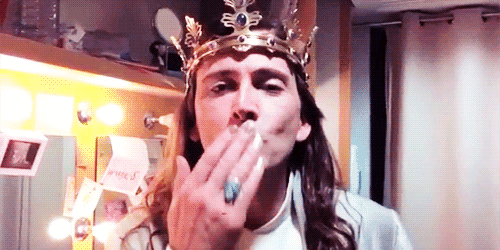
#personal post#busy work life + busy Tumblr life = executive functioning nightmare#i need to organize my thoughts#i love my anons#and i will say thank you#and get back to answering the anons i have waiting#can't wait to flail with you all over Michael and David together#good times#public service announcement#<3
12 notes
·
View notes
Note
Was a watching Georgia’s stories answering questions and there was one about lights on or off. I don’t really know what that means. Can anyone explain please?
Hi, Anon! So, for those who didn't see Georgia's Insta stories yesterday, here is a screenshot of the story in question:

As to what this means, I can offer my interpretation, but with one caveat, which is that I'm not entirely sure how the question-asker meant it, or how Georgia interpreted it. But from my experience, "lights on or off?" typically refers to sexual preferences. (In other words, do you prefer to have sex with the lights on or the lights off.) One example that comes to mind is the character Faith in a season 3 episode of Buffy the Vampire Slayer:

From this context, we can see that the question is referring to something sexual (along with "kinks or vanilla?" which refers to whether one enjoys rougher/kinkier sex or more traditional "vanilla" sex).
Now, again...whether this was actually what Georgia meant, I mean...who knows. Could she have meant that she just likes to sit in a room with the lights off instead of on? Sure, why not. But going by the popular vernacular (and where my mind went), this would be what most people would think of when they see that phrase. So, the conclusion we could arrive at would be that Georgia prefers to have sex with David with the lights off. Interpret that however you will...
(Also, it bears mentioning that this doesn't say anything about whether David likes to have sex with the lights on or off, but that's a whole other discussion for another day...)
I hope this helps you out, Anon. Thanks for writing in! x
#anonymous#reply post#georgia tennant#david tennant#soft scottish hipster gigolo#also if Georgia does like to have sex with the lights off that would explain a few things#in contrast i have a feeling Michael likes to fuck in broad daylight#i'm just saying#wanted to answer these because of timing#busy work life + busy tumblr life = executive functioning nightmare#discourse#gif by me
8 notes
·
View notes
Text
Hello, lovely followers. I’ve got another conference coming up this week that I have to travel for, and I’m jammed up with prep for my speaking engagements. Also getting overwhelmed with the amount of Anons in my inbox, so I’m going to go ahead and temporarily turn off Anons again until I can clear some of the backlog from the past week.
Thankful to all of you as always for your patience, and for continuing to follow my blog. 💗 Will start answering your questions soon!

#personal post#public service announcement#my inbox overrunneth#busy work life + busy Tumblr life = executive functioning nightmare#also i had other stuff i was hoping to write about#so i just want to handle all of these anons and then hopefully move on#thank you all you lovely people for being here#<3
13 notes
·
View notes
Text
Trying to finish one of my MS/DT WIPs right now (which is also the first fic I’ve attempted to complete in over a year), but feeling a bit stuck and could use some words of encouragement. Does anybody want to read a Michael/David fic?

#fanfic#i have four unfinished MS/DT fics in my drafts#and ideas for others#and i feel really bad that i haven't finished any of them yet#busy work life + busy Tumblr life = executive functioning nightmare#and then i have The Voice in my head yelling at me that what i'm writing is no good#i'm trying to get that voice to shut up rn#so encouraging comments on this post are more than welcome#personal post
18 notes
·
View notes
Note
Hi Amy! I noticed that you're a bit quiet lately, so just checking in and asking how you are, just in case! Obviously there's not much content right now, so that might just be the reason, but still. Hope you're fine and sending lots of love. 🤗🤗
Hi, Anon! Aw, thank you for this very sweet message...I truly appreciate it! I’m doing fine, and while it seems like there isn’t much content at the moment, I’ve actually got a ton of wonderful Anons in my inbox waiting to be answered. The reason I’ve been quiet is that I’ve had a lot of work to catch up on, and I knew if I tried to do both work stuff and Tumblr stuff, neither one would be at the level that I would want them to be at.
Also, as those of you who follow me know, I tend to write lengthy responses to my Anons, so I wanted to be sure I had the time to really sit down and focus on answering those Anons, but what’s also made that difficult is I keep getting new Anons on top of the already existing ones, which also ends up overwhelming me. So I’ve gone ahead and (temporarily) turned off Anons again, just so I can catch up on the ones already waiting.
Thank you again for checking in, Anon. I don’t know if you’re the same person who’s messaged me previously when I’ve been quiet or someone else, but either way, it’s really lovely to know that folks care so much. I’m so very glad you’re here! xx

#anonymous#reply post#i love my anons#i keep wanting to be active on here but it's been hard to switch from work mode to Tumblr mode#busy work life + busy Tumblr life = executive functioning nightmare#i am just glad people are enjoying my ridiculous posts#thank you all you lovely people for being here#personal post#<3
8 notes
·
View notes